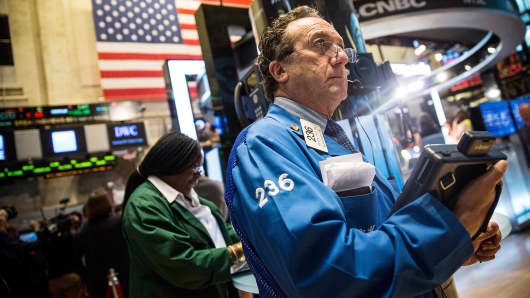US Markets
U.S. stocks jumped on Friday, with benchmark indexes
turning higher for the week, on signals of reduced tensions in the
Russian-Ukraine crisis and as Wall Street viewed American military moves
in Iraq as limited.
Reuters, citing Russia's Interfax, reported that Russia had ended military exercises near the Ukrainian border. The war games, which began Monday, were scheduled to end Friday, according to media reports including the Guardian.
"This is a good excuse to work off an oversold condition," said Peter Boockvar, chief market analyst at the Lindsey Group, who questioned whether the development truly shed any light on Russian President Vladimir Putin's intentions.
The CBOE Volatility Index, a measure of investor uncertainty, fell 5.3 percent to 15.77.
Ahead of Friday's open, stock-index futures had fallen on word President Barack Obama had authorized air strikes in Iraq, only to turn higher on reports that Russia might to be looking to de-escalate tension over Ukraine.
"Iraq is a tragedy, but the president made clear our engagement is going to be limited. While the markets always sell off immediately in the face of uncertainty, it doesn't take long to realize this airstrike against ISIS (Islamic State in Iraq and Syria) doesn't change the geopolitical picture in any significant way," said David Kelly, chief market strategist at J.P. Morgan Funds.
"We've been in a corrective mode over the last two weeks, but I don't think the geopolitical risks have become noticeably worse, and the earnings season, which should matter the most, has turned out to be good," said Kelly.
There's a disconnect for average Americans and Wall Street's gains, as "it feels like this has been a lousy economy, and the market is up a lot, so people think it must be overvalued, but that is not true. This is the type of economy that helps corporate earnings much more than the individual. It may not feel great, so it's natural to assume the market is too expensive, but we don't think it is, based on the numbers," Kelly said.
The Pentagon's press secretary said via Twitter on Friday that U.S. military aircraft had struck rebel artillery that was being used against Kurdish forces defending a position near American personnel. American officials told NBC News on Friday afternoon that U.S. military warplanes had launched another round of airstrikes against an Islamic State target in Iraq.
"Does that speak to an escalation of tension, or a resolution in that geopolitical hot spot; there's an argument to be made for the latter," Art Hogan, chief market strategist at Wunderlich Securities, said of the U.S. military action in Iraq.
Stock-index futures had risen on a news report signaling Russia might be looking to de-escalate the Ukraine conflict, offsetting declines that came with President Barack Obama's decision to authorize airstrikes in Iraq.
Read MoreSoftening Moscow rhetoric eases rough ride for markets
Reuters, citing Russia's Interfax, reported that Russia had ended military exercises near the Ukrainian border. The war games, which began Monday, were scheduled to end Friday, according to media reports including the Guardian.
"This is a good excuse to work off an oversold condition," said Peter Boockvar, chief market analyst at the Lindsey Group, who questioned whether the development truly shed any light on Russian President Vladimir Putin's intentions.
The CBOE Volatility Index, a measure of investor uncertainty, fell 5.3 percent to 15.77.
Ahead of Friday's open, stock-index futures had fallen on word President Barack Obama had authorized air strikes in Iraq, only to turn higher on reports that Russia might to be looking to de-escalate tension over Ukraine.
"Iraq is a tragedy, but the president made clear our engagement is going to be limited. While the markets always sell off immediately in the face of uncertainty, it doesn't take long to realize this airstrike against ISIS (Islamic State in Iraq and Syria) doesn't change the geopolitical picture in any significant way," said David Kelly, chief market strategist at J.P. Morgan Funds.
"We've been in a corrective mode over the last two weeks, but I don't think the geopolitical risks have become noticeably worse, and the earnings season, which should matter the most, has turned out to be good," said Kelly.
There's a disconnect for average Americans and Wall Street's gains, as "it feels like this has been a lousy economy, and the market is up a lot, so people think it must be overvalued, but that is not true. This is the type of economy that helps corporate earnings much more than the individual. It may not feel great, so it's natural to assume the market is too expensive, but we don't think it is, based on the numbers," Kelly said.
The Pentagon's press secretary said via Twitter on Friday that U.S. military aircraft had struck rebel artillery that was being used against Kurdish forces defending a position near American personnel. American officials told NBC News on Friday afternoon that U.S. military warplanes had launched another round of airstrikes against an Islamic State target in Iraq.
"Does that speak to an escalation of tension, or a resolution in that geopolitical hot spot; there's an argument to be made for the latter," Art Hogan, chief market strategist at Wunderlich Securities, said of the U.S. military action in Iraq.
Stock-index futures had risen on a news report signaling Russia might be looking to de-escalate the Ukraine conflict, offsetting declines that came with President Barack Obama's decision to authorize airstrikes in Iraq.
Read MoreSoftening Moscow rhetoric eases rough ride for markets
After falling four points early on, the Dow Jones Industrial Average rose 185.66 points, or 1.1 percent, to 16,553.93, with Home Depot leading blue-gain gains that included 28 of 30 components and had the index up 0.4 percent for the week.
McDonald's reversed losses that came after the fast-food giant reported worse-than-expected July sales.
Rising 0.3 percent from the week-ago close, the S&P 500 added 22.02 points, or 1.2 percent, to 1,931.59, with utilities pacing gains that extended to all 10 of the S&P's main sectors.
Friday proved the best session in five months for the Dow and S&P 500.
The Nasdaq climbed 35.93 points, or 0.8 percent, to 4,370.90, with the index netting a 0.4 percent weekly gain.
For every shares falling, roughly three rose on the New York Stock Exchange, where nearly 629 million shares traded. Composite volume approached 2.9 billion.
The dollar held steady against the currencies of major U.S. trading partners; the yield on the benchmark 10-year note gained a basis point to 2.421 percent.
Strategist: 'Fragile five' help keep US yields low
On the New York Mercantile Exchange, crude futures turned higher, gaining 31 cents to end at $97.65 a barrel; gold futures also reversed direction, losing $1.50, or 0.1 percent, to finish at $1,311.00 an ounce.
Geopolitical concerns overtook economic reports, which on Friday included data from the Labor Department that had nonfarm productivity rebounding more than expected in the second quarter, with a drop in labor costs pointing to still-tame wage pressure.
Read MoreSecond-quarter productivity back from the brink; wage growth muted
"On balance, economic data continue to be constructive and ignored," said Hogan at Wunderlich Securities.
Separately, the Commerce Department reported wholesale inventories rose less than expected in June.
Thursday evening, Obama told a press conference he had authorized the U.S. military to make targeted airstrikes to protect American personnel in Iraq. His remarks came as the U.S. began an effort to drop humanitarian aid to Iraqi civilians in the northwest of the country.
On Thursday, stocks declined, pushing the Dow further into the red for the year, as Wall Street echoed action in European markets amid unease over the crisis in Ukraine.
Read MoreStocks lower; investors rattled by Russia
Strategist: 'Fragile five' help keep US yields low
On the New York Mercantile Exchange, crude futures turned higher, gaining 31 cents to end at $97.65 a barrel; gold futures also reversed direction, losing $1.50, or 0.1 percent, to finish at $1,311.00 an ounce.
Geopolitical concerns overtook economic reports, which on Friday included data from the Labor Department that had nonfarm productivity rebounding more than expected in the second quarter, with a drop in labor costs pointing to still-tame wage pressure.
Read MoreSecond-quarter productivity back from the brink; wage growth muted
"On balance, economic data continue to be constructive and ignored," said Hogan at Wunderlich Securities.
Separately, the Commerce Department reported wholesale inventories rose less than expected in June.
Thursday evening, Obama told a press conference he had authorized the U.S. military to make targeted airstrikes to protect American personnel in Iraq. His remarks came as the U.S. began an effort to drop humanitarian aid to Iraqi civilians in the northwest of the country.
On Thursday, stocks declined, pushing the Dow further into the red for the year, as Wall Street echoed action in European markets amid unease over the crisis in Ukraine.
Read MoreStocks lower; investors rattled by Russia
—By CNBC's Kate Gibson









0 σχόλια:
Δημοσίευση σχολίου
Ο σχολιασμός επιτρέπεται μόνο σε εγγεγραμμένους χρήστες